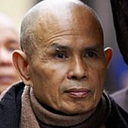Give Me Some Tobacco!
In recent years, prisons have had access to books on meditation, magazines, and even recordings of mindfulness talks. I often receive letters from prisoners, usually from prisons in North America. One inmate wrote to me, saying, “When I stand at the top of the staircase and look down, I see other inmates running up and down, and I can see their suffering, their agitation. I wish they could do what I do, and walk up and down the staircase in mindfulness, following their breathing. When I do that, I feel peace within myself, and when I feel peace within myself, I can see very clearly the suffering of the other inmates.”
Another time I heard from a prisoner on death row who had received two copies of one of my books, Being Peace. He himself had enjoyed the book and had started practicing sitting meditation in his cell. One day the fellow in the cell next to his banged on the wall and shouted out, asking for tobacco.

Although the prisoner who meditated didn’t smoke anymore, he still had some tobacco. He took the first page of Being Peace, wrapped some tobacco in it, and sneaked it to the other side with the hope that the other person might enjoy reading Being Peace. He just gave a small amount of the tobacco he had, and the next time his neighbor asked for tobacco, he used page two, then page three. Finally he had transferred the whole book, page by page, to the other prisoner.
In the beginning his neighbor had banged and shouted and cursed. But soon he became much quieter. Eventually he became very calm. On the day his neighbor was released, as he passed in front of his cell, they looked at each other, and together recited a sentence from the book, which they both knew by heart.
It is clear that punishment is not the only solution to crime.
There are much more effective and compassionate things we can do to help those who have broken the law. I was once asked to write a letter of encouragement to a prisoner named Daniel, who was on death row in Jackson, Georgia, in the United States. He was nineteen when he committed his crime, and had spent thirteen years — his entire adulthood — behind bars. He had read a book of mine and found it very helpful as the time of his execution was drawing near.
I sent Daniel a short handwritten note that said, in part: “Many people around you have a lot of anger, hate, and despair, which prevents them from getting in touch with the fresh air, the blue sky, or the fragrant rose. They are in a kind of prison. But if you practice compassion, if you can see the suffering in the people around you, and if every day you try to do something to help them suffer less, then you are free. One day with compassion is worth more than one hundred days without it.”
We who suffer less on the outside can do something to help those on the inside. The death penalty merely reveals our weakness and helplessness. We don’t know what to do and we give up. It is a cry of despair when a society has to kill people. It is possible to reconcile justice and compassion, and to demonstrate that true justice must contain both compassion and understanding.
From At Home in the World: Stories and Essential Teachings from a Monk’s Life
© 2016 — Available from Parallax Press
Thich Nhat Hanh
